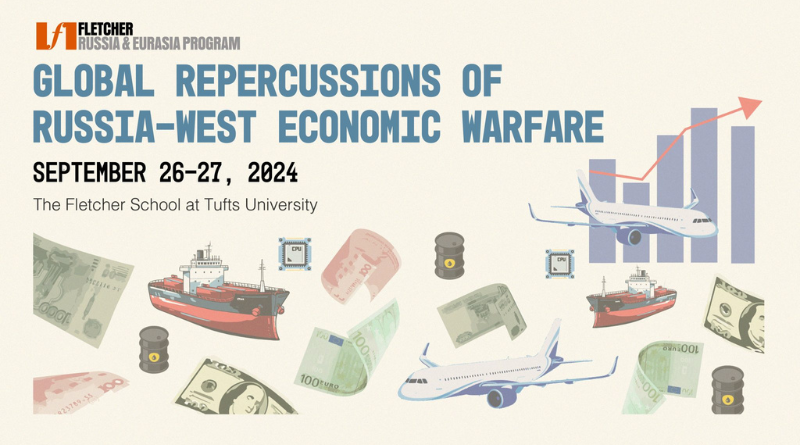
A New Era of Economic Warfare
Russia’s invasion of Ukraine has reshaped the conduct of economic statecraft around the world. The Western sanctions regime against the Kremlin and ensuing Russian countermeasures have rewired global commerce, with significant repercussions for the international financial system, energy markets, and complex manufacturing sectors.
Throughout this tumultuous period, experts at The Fletcher School’s Russia and Eurasia Program have played a leading role in shaping public understanding of the transformed economic landscape.
“The future of technological progress, regional stability, energy security, and the global economic landscape are all implicated in this economic conflict,” said Chris Miller, Professor of International History and Co-Director of the Russia and Eurasia Program. Miller’s scholarship on sanctions policy led to his own sanctioning by the Kremlin.
In its mission, the Russia and Eurasia Program aims to educate future scholars and practitioners, generate cutting-edge scholarly analysis, and foster cooperation with institutions in the Eurasian region. As relations between Russia and the West plunge to new lows, the program’s work takes on vital importance.
To explore the new period of economic conflict, the Russia and Eurasia Program will host a special academic conference on September 26-27, 2024. Titled “Global Repercussions of Russia-West Economic Warfare,” the conference will convene prominent scholars and policymakers for a series of wide-ranging discussions on sanctions, trade controls, and their impact on countries and industries.
“Western sanctions against Russia have the potential to scramble the global political economy for decades to come,” says Daniel Drezner, Distinguished Professor of International Politics and Co-Director of the Russia and Eurasia Program. “This conference will draw on some of the best analytic minds working on this subject to provide some illumination into the future of the global economy.”
Speakers at the conference include Fletcher faculty members Miller, Drezner, and Sulmaan Khan, alongside Fletcher visiting scholars Pavel Luzin and Mikhail Troitskiy. Joining them are an array of policy experts from universities, think tanks, and government service, including Fletcher alumni Mihaela Papa F03 FG10 and Sergey Vakulenko.
For Russia-born scholar Luzin, recent events have seismically shifted the country’s economic trajectory.
“The paradigm of Russia’s industrial development from the previous 30 years has been destroyed,” he said. The period of economic warfare has “deprived Russia of access to advanced technologies, machine tools, and capital.”
Russia’s decoupling from the Western economy has been felt far beyond Moscow. Great powers including China and the United States increasingly view trade, technology, and financial ties not only through an economic lens, but as core matters of national security.
According to Arik Burakovsky, Assistant Director of the Russia and Eurasia Program, the upcoming conference will place these transformative shifts into the spotlight.
“The insights from our conversations will be crucial for understanding the evolving dynamics of global power.”
Read more about the conference and register here.
(This post is republished from The Fletcher School)
